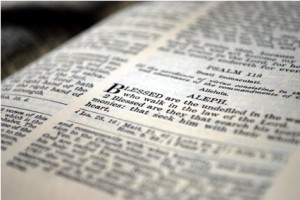The Depressing Pew Forum Study
by Bishop Robert Barron | October 27, 2010 12:01 am

Photography by Andy Coan
The Catholic Church is suffering mightily today from two self-inflicted wounds. The first is the clerical sex abuse scandal, involving the gross violation of the most vulnerable members of the community by some priests and the countenancing or enabling of this crime by some bishops. This outrage has been the perfect storm. Not only has it deeply wounded young people; it has also compromised the work of the church in almost every way, since it has undermined so thoroughly the credibility that the church requires in order to teach, preach, catechize, and evangelize. If you had asked me twenty years ago what the worst moment in American Catholic history was, I would have identified the mid nineteenth century, when anti-Catholic bigots were burning down convents, attacking priests, and organizing political parties whose purpose was the elimination of Catholicism on these shores. But now I would say that we are living, right now, through the worst moment in American Catholic history.
The other self-inflicted wound occurred many years ago but has had, perhaps, just as devastating an impact as the sex-abuse crisis. In the years immediately following Vatican II, many Catholic leaders felt that the primary mission of the church was to embrace the modern world and accordingly, they threw off much of the philosophy, art, poetry, and theology that made Catholicism counter-cultural, distinctive, unique. As the slogan of the 1960’s had it, “the world sets the agenda for the church.” The conditions for the possibility of this approach were both an extraordinary under-appreciation for the genius of the Catholic tradition, and an equally extraordinary over-appreciation of modern culture. The consequence was what I have termed a “beige Catholicism”—bland, accommodating, hyper-apologetic, unsure of itself. The beige church certainly went running after modernity, but modernity continued to run away, indifferent to its ardent pursuer. And then, in the wake of the events of September 11th, elements of that modern culture turned aggressively round on the church and accused it of irrationality, superstition, and violence. The “new” atheists—Christopher Hitchens, Daniel Dennett, Richard Dawkins, and others—have been characterizing the very idea of God as ridiculous and attacking the institutions of religion as corrupt and backward-looking. And confronted with this enemy, the church has found itself defenseless, having jettisoned much of its own rich intellectual tradition. The beigification of Catholicism has, therefore, also crucially compromised the church’s ability to evangelize.
All of this came to mind when I read the results of the recent Pew Forum Study on religious knowledge among Americans. The surveyors asked a representative sample of Americans a series of 35 questions dealing mostly with Christianity but also with the other great world religions. They discovered that, of all the groups who were questioned, atheists and agnostics performed best of all. They were followed by Mormons and Jews, with mainstream Protestants and Catholics considerably back in the pack. Distressingly, the worst performers of all were Hispanic Catholics. Apparently the enemies of the faith know it best, while the supposed defenders of the faith are rather confused about it. Not surprisingly, the atheists have seized on the results of this survey with a certain glee, arguing that to know religion is to hate it and, by implication, not to know it very well is the condition for the possibility of falling for it. This is, obviously, a sorry state of affairs for us believers, and it has been produced, in large part, by the accommodating, beige attitudes I described above. If the program is primarily dialogue with the culture, why bother reverencing and passing on the intellectual and cultural heritage of the Catholic Church? If all that really matters is “being a nice person,” then why bother learning the faith?
The good news is that this trend can be reversed; the bad (or at least challenging) news is that it will require a lot of work. Catholicism is a smart and beautiful tradition. It includes the varied and complex texts of the Bible, the systematic theology of St. Irenaeus, the Platonizing theology of Origen and Augustine, the sermons of John Chrysostom, the exquisitely articulated arguments of Thomas Aquinas, soul-stirring Gregorian chant, the life-changing poetry of Dante, the mysticism of Bernard, Teresa of Avila, and John of the Cross, the stained glass of Chartres Cathedral, the Sistine Chapel Ceiling, the soaring polyphony of Palestrina, Mozart’s “Requiem,” John Henry Newman’s Essay on the Development of Doctrine, Hans Urs von Balthasar’s stunningly rich theological vision, and John Paul II’s Veritatis Splendor. We need a new army of priests, sisters, teachers, and catechists who love this tradition enough to know it inside and out—and who have the passion to pass it on. As I have argued before, we have instructors in our Catholic high schools, who are willing and able to communicate “Hamlet” and Virgil’s “Aeneid” to young people. Why not some masters willing and able to pass on Aquinas and Dante?
That the atheists know this faith of ours better than we is, quite frankly, pathetic. But it is also a call to arms. Let us reclaim our great heritage.
Source URL: https://integratedcatholiclife.org/2010/10/barron-the-depressing-pew-forum-study/